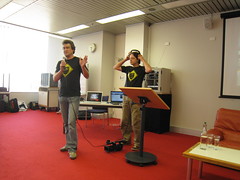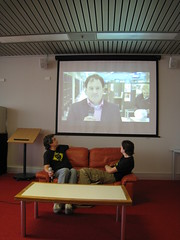I attended the Shanachie talk at the State Library of Western Australia yesterday.
Jaap van de Geer and Erik Boekesteijn are from DOK in Delft, the Netherlands. Erik is head of ICT while Erik is head of PR, Marketing, Communications.
They started by telling us that libraries are disappearing all over the Netherlands and the US. What can be done about this? They are just two regular librarians who want to share their stories, and inspire other regular librarians to look at our communities and consider what we can do to build services and resources for the future. Apparently, in NL librarians are talking about web 2.0 but no one is really doing much about it, either!
It all started in London, apparently. Erik and Jaap attended the 2006 Internet Librarian International Symposium there. They met Jenny Levine and Michael Stephens there – and clicked.
Probiblio, a Dutch library organisation wanted to know more about gaming in libraries, and these two enterprising librarians managed to get together enough funding to go on a trip to Chicago to learn more. They interviewed Jenny and other librarians in the Chicago area and created a movie/presentation: If you’re not gaming you’re losing. We saw highlights from an interview they conducted with a couple of librarians from Kankakee Library, where they have created a games programme for the young adults. This programme has meant that book circulation among the area’s teens has increased 70%. One of the librarians stressed that it is important to give kids clear guidelines so they know what to expect, guidelines that are not too strict, but also not too lenient.The library in Kankakee provides a safe environment for teens to come and learn “the socialisation skills necessary to be competitive in the technology motivated generation yof the future”. I found it impressive that the teens were coming to the library even in bad weather.
One of the Kankakee staff members admitted that he initially disliked the idea of providing gaming in the library, and felt that it was better to emphasise academic pursuits in the library. Through his involvement in this project, he realised he could find ways “to slip in academic stuff for the kids” who were in the library to play games. One example of this was the use of journals to record kids’ thoughts – this improved teens’ reading and writing skills. They also made sure they put teen oriented materials around the gaming areas, and the kids of course started looking through these materials in between games. The librarian who hadn’t been a gaming advocate made the great point that “before you can work with someone, you must capture their interests and heart”.
The next interview was with Michael Stephens, who asked: how do all the new technologies and tools meet the needs of libraries and the missions of libraries for outreach, stewardship, service, access to info? Can the library facilitate access to technology for the 43% of kids who don’t have access to technology and who are not learning the skills that the other 53%, who are participating and creating stuff for the web, are?
While in the US, Erik and Jaap interviewed Paul Holdengräber from the New York Public Library. Paul was amazing to listen to; he talked a mile a minute in soundgrabs and still managed to make one think. I don’t know much about him, but from the interview I gather that he has been instrumental in creating a number of art institutes; he stressed that they were institutes, because the word “institute” is more of a verb than noun – an organisation that insititutes, initiates, and, when successful, irritates. He was interested in creating living museums, not places that were resting places for old masters. He was hired oxygenate the New York Public Library. He pointed to the two stone lions outside the library, representing patience and fortitude – how to make them roar? Paul wants to create a library without walls- less formidable, daunting, intimidating – more sexy! He acknowledged the how technology gaps in society and wants to bridge them. Should the library be taking over what school is not doing? For example, art education is underfunded and undervalued in the US (and in other parts of the world), because people don’t consider art essential, considering information to be more important than inspiration. We need inspiration, Paul Holdengräber stressed.
We were shown the “flight case” – this is a portable box that enables you to transport games and gaming consoles. My description is not doing it justice so take a look at this video. 19 libraries in the Netherlands have bought this flight case.
Erik and Jaap went to Jamaica earlier this year, to attend the Caribbean Library Association conference. They interviewed Stephen Abram, who was there as keynote speaker. Stephen’s points:

Change not bad: let’s see it as a time of renewal or renaissance
The world is very different now, with unlimited information, as opposed to the world of the past where information was limited
It’s more than just text
We need to understand end users’ learning styles (we librarians see ourselves as alpha users – others have styles that are valid also)
the library as part of community
Answering questions isn’t as important as transferring skills
info design – how do we build virtual environments that are engaging to visual learners? We mustn’t be prejudiced against different formats, such as youtube (A similar point was made by another librarian in Salt Lake City: it’s not about books, it’s about containers – containers for info and culture – what is the best way to transmit the info, the culture?)
How do we allow ppl to engage with us and our collections?
PLAY – spend 15 mins day learning – don’t worry about TRAINING!!!!!! (that’s what I noted, complete with exclamation marks) When it’s experiential, not so stressful (think 15 minutes a day as opposed to hours and hours of training) To understand web 2.0 you need to play to learn – you need to experience! The abstract view is not enough – cited the example of kids learning about sex but it remains abstract 🙂 you don’t know until you do
Build relationships with people in diff disciplines
After showing us highlights of their US tour they talked about their library, where “people are the most important collection”.
DOK is an amalgamation of a library, music centre and art centre. The letters DOK stand for Discotheque – Openbare bibliotheek (public library) – Kunst (art) – all of which make up the Delft Library Concept Centre. The ideas for fundraising and value-added services were very interesting. DOK used to be the 3rd worst funded library in the country – now it looks like a great library.
Other interesting projects the Shanachies have been working on: Dark Ink, a game which aims to provide library content. Also the Agora project, which I think aims to collect local and personal histories. (Must find out more about these two projects.)
2 Comments
Paul H is definitely someone I want to find out more about. His use of language was just – soaring. Wonderfully poetic and playful and dense. Oh, and I liked the meaning too 🙂
Yep, I was quite intrigued by Paul Holdengräber’s spiel. Looks like he’s been at NYPL for a little while now. I wonder if he’s on Twitter 😉